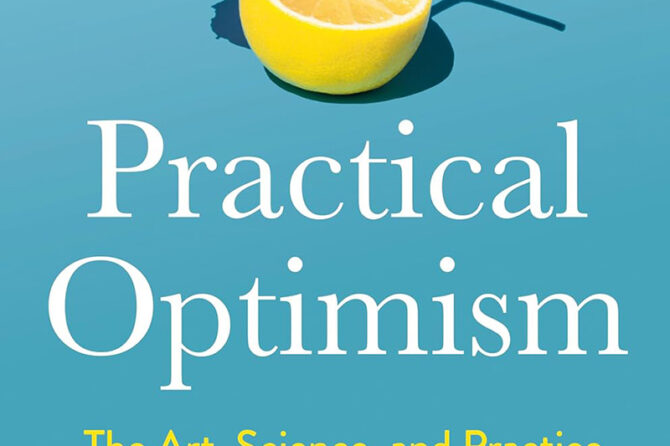
In an era where self-help literature burgeons on bookshelves with promises of transformative change, Dr. Sue Varma’s “Practical Optimism” carves out a distinct and compelling niche. This book is not merely another addition to the genre but an essential guide that combines a resilient mindset with evidence-based tools to foster a meaningful transformation in the reader’s life. Varma’s approach transcends the typical narrative of combating stress, aiming instead to cultivate a secure, self-assured foundation from which confidence, talents, and a life of fulfilment can flourish.
The Essence of Practical Optimism
At the heart of “Practical Optimism” is the ambitious goal of developing a secure and level-headed sense of self-worth. Varma postulates that firm self-esteem is the bedrock upon which confidence is built, enabling individuals to unlock their innate strengths and talents. This foundation, according to Varma, is pivotal for constructing a life replete with meaning, purpose, connection, and joy. The principles of Practical Optimism (PO) are designed not just to mitigate stress but to enhance resilience, thereby fostering an environment where one can thrive amid life’s vicissitudes.
Purpose and Passion
Dr. Varma encourages readers to identify and invest in authentic goals that not only inspire but also energize them. She emphasizes the importance of cultivating curiosity, finding flow in challenges, and the significance of mentorship—both in being mentored and in mentoring others. The idea of connecting with awe and finding purpose within a community, whether through a networking group or a book club, is presented as a pathway to deeper fulfillment.
Emotional Resilience and Perception
A novel aspect of Varma’s methodology is her treatment of stress and emotional processing. She posits that the crux of the issue lies not in the stressors themselves but in our perception of them. By harnessing the power of pressure situations to work in our favour, we can shift conditions to perform optimally. This perspective shift is crucial for emotional resilience, emphasizing the power of perception in managing life’s challenges.
The Unclaimed Opportunities
“Practical Optimism” also addresses the missed opportunities stemming from inaction. Varma highlights the importance of proactive problem-solving and emotional intelligence. By understanding and addressing our emotions constructively, we can navigate life’s challenges more effectively. This approach underscores the significance of emotional cues in guiding our behaviour towards either constructive or destructive paths.
The Value of Leisure
Varma challenges the notion that rest and relaxation are rewards, arguing instead that they are essential components of a healthy life. A leisure practice, as she outlines, is a form of self-compassion and gratitude towards our bodies and minds for their relentless service. She links leisure to improved physical and mental health outcomes, advocating for a balanced approach to productivity and downtime.
Empathy and Interconnection
The book delves into the power of empathy, proposing that a compassionate approach towards oneself and others can foster a sense of interconnectedness with the broader human experience. This interconnectedness, Varma suggests, extends our concern beyond our immediate ego and personal goals to the wider human family, fostering empathy even towards those who challenge us.
Lifelong Learning
Varma champions a mindset of continuous learning and mastery. By embracing challenges and dedicating oneself to improvement, she argues, individuals can achieve authentic success and happiness. This approach to learning and growth is presented as a counterbalance to the pursuit of external approval, emphasizing internal mastery over superficial achievements.
Cognitive Awareness and Mental Health
“Practical Optimism” addresses the cognitive traps that ensnare our attention—dwelling on the past, fretting about the future, and succumbing to unhelpful comparisons. Varma advises readers to get granular with their goals, ensuring they align with personal values rather than arbitrary standards. This tailored approach aims to create achievable, meaningful objectives that resonate on a personal level.
The Four Ms of Mental Health
In concluding her guide, Varma introduces the “Four Ms of Mental Health”: Mastery, Movement, Meaningful Engagement, and Mindfulness. Each element is explored as a pillar for sustaining mental health, with practical strategies for integrating them into daily life. The overarching message is clear: breaking through the self-imposed limitations of our mental glass ceilings is the first step towards a richer, more fulfilling existence.
Final words
“Practical Optimism” by Dr. Sue Varma is more than a self-help book; it is a manifesto for living a life rich with purpose, joy, and resilience. Through a blend of evidence-based strategies and compelling narratives, Varma offers readers a roadmap for navigating the complexities of modern life with grace and optimism. This book is a beacon for those seeking to cultivate a deeper sense of self-worth, emotional resilience, and a meaningful connection with the world around them. In “Practical Optimism,” Varma has not only provided a toolkit for personal growth but has also ignited a movement towards a more hopeful and empowered way of living.
Leave a reply
















Superb review sir . Will definitely buy and read the book 👍
ReplyPrahlada Sir,
Practical optimism as for personal growth, involves positive mindset & taking
proactive steps to improve oneself.
Positive Psychology = Learned Optimism ; Martin Seligman is considered as the founder of positive psychology movement. His research suggests that it may be beneficial to teach kids optimism skills late enough in childhood so that kids have the metacognitive skills to think about their own thoughts, but prior to the onset of puberty. Teaching such skills during this critical period might be the key to helping kids ward off a number of psychological maladies, including depression.
Reply